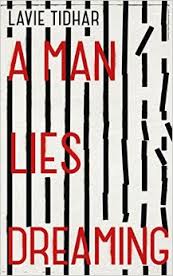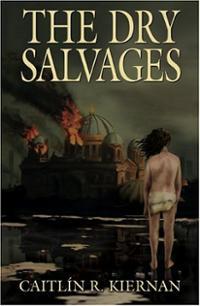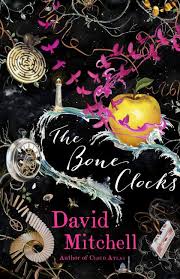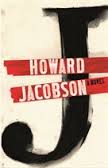His life had been erased like his books, set alight, reduced to ash and scattered. It no longer existed. But then, all lives were ultimately extinguished, and in their passing nothing remained of the person who’d been – their dreams, their thoughts, who they loved, what they’d hated – from Neanderthals and Cro-Magnon and down the ages to Jews.
Yet Shomer lives still.
I loved Lavie Tidhar’s Osama. In terms of both content and form that novel presents a bold statement, and its recognition in the World Fantasy Awards was the ‘yes!’ vote of its year. I was less fond of Tidhar’s follow-up, The Violent Century. Unlike some others, I found no problem with the author’s decision to eschew speech marks, and the terse rhythms of the narrative, styled to mimic the speech bubbles of a graphic novel, worked fine by me. It was the narrative itself that never won me over. Twentieth-century history with added superheroes? The Bond-style plot is paper thin, the bolt-on romance seriously unconvincing. As a deconstruction of the superhero mythos, Nick Harkaway’s more recent Tigerman, for me at least, does a far more interesting job.
Tidhar’s latest novel, A Man Lies Dreaming displays not only a return to form but a solid improvement. This is a brave book. Any writer as intelligent as Tidhar will be well aware of the near-impossibility and inherent foolhardiness of taking on a subject of the magnitude and gravitas of the Nazi holocaust as a material for fiction. So many have been there before him. Some have flailed around embarrassingly, others have exploited shamefully, a few have succeeded in increasing the sum of the world’s literature with grace and fervour. That Tidhar dares to go there is one thing. That he has managed to create a work that is original, and funny, and angry, and moving, and significant, beautiful even – these are achievements he should be proud of. Bravo.
Shomer, a Jew, a father, a writer of pulp fictions, lies dreaming in Auschwitz. He imagines a reality in which the communists won the 1933 elections, in which Hitler was expelled from Germany and forced to make his living as Wolf, a private detective in a London populated by his erstwhile comrades, all now similarly reduced in circumstance, scraping along the best they can, reviled as immigrants by Oswald Mosley’s ascendant Blackshirts.
Wolf’s farcical exploits and sexual misadventures are the stuff of pulp fiction – Shomer’s pulp fiction. It’s all very funny and very repulsive at the same time. But there’s more to it than that. The alternate history in A Man Lies Dreaming kept reminding me of the real history in Menno Meyjes’s 2002 film Max, in which John Cusack plays Max Rothman, a wealthy Viennese art dealer who feels a strange comradeship with the disaffected war veteran Adolf Hitler (Noah Taylor). This 1919 Hitler is history in embryo, an embittered ex-corporal still torn between his former yearning to be an artist and his newly found visibility on the political stage. Max shows us a glimpse of what might have been, a turning point in history where had circumstances been minutely otherwise, Hitler might have remained what he was at the time: a nonentity with pretensions.
He had begun to perceive the great conspiracy behind all things; perhaps even then, so early, he knew it was his destiny to fight it; and yet, in the final tally, he had lost. The Fall had made a mockery of Wolf. Imagine if he had succeeded, if Germany was his, its military and its citizens, to wield as he saw fit: what would have happened to the Jewish people then?
(A Man Lies Dreaming p 99)
And of course we as readers, living in the alternate world of Shomer’s imagination, know the answer to that question all too well.
The way Tidhar tackles his subject – linking it with contemporary issues such as American expediency politics, the casual (and not so casual) racism that continues to permeate British political culture, demonstrates how it is still not only possible but necessary for us to keep writing about the Nazi holocaust, that this task can still be accomplished with impact and originality and (perhaps most difficult of all) personal commitment. As Howard Jacobson does, rather differently, in his meta-dystopia J, Lavie Tidhar’s A Man Lies Dreaming shows us the holocaust as part of a historical continuum. It is not over, it is certainly not nearly enough to speak of it in hushed tones and then promptly forget about it. Given the airtime currently being lavished upon certain would-be members of parliament in our midst, the material relating to Oswald Mosley’s theoretical election victory near the end is particularly hard to read:
‘[Communism] has flooded our country with refugees. We have opened our borders, our arms, our homes to them, in friendship. And they came, in their thousands, in their thousands of thousands. Our cities reek of their cabbage! Their children speak foreign tongues in our schools. They are draining our country of its resources, they are taking the very bread from our own people’s mouths!’ (p238)
Tidhar’s novel also shares with Jacobson’s J the sense of being not just an exercise in possibility but a deeply personal, deeply committed statement by the author. This is what drives the book beyond mere cleverness and towards significance. (There is information relevant to this in the Historical Note at the end, but it is important to note that the novel stands perfectly well without it.)
And it is precisely because Tidhar has such fluent command of the non-fiction behind his fiction that he is able to play with it, to bend it so successfully into such bizarre shapes. There are hundreds of jokes in here – asides, quotes, comments, unmaskings, language-plays, amusing truisms about writing, there’s even an Elder Gods reference in amongst it all – the kind of tricks that only a writer who has fully assimilated their source material could pull off. As with any successful meta-text of this type, it is so soundly constructed as story that a reader who is less familiar with the history, politics or cultural background will be able to enjoy this novel perfectly well without having to consult a history book at every other page. For those who come to it more fully prepared, it will be a tour de force of ferocious ingenuity. It is also worth noting how splendid this book is as science fiction, and as a subversion of science fiction. Here again Tidhar knows his stuff, and lets it sing:
Eleven, old Ben struck, and the second stretched and stretched and in its expectant silence Wolf saw the city as he had never seen it, rising before him like a metropolis dreamed of by Fritz Lang: huge shining buildings rose amidst the squalor of old London, by London Bridge a shard of glass taller than the pyramids pierced the sky. From the City of London there rose a phoenix egg of metal and glass, and a giant wheel spun and spun on the south bank of the Thames like a mandala. This city of the future was brighter, brasher, awash in an electric glow which faded as he watched, the ghostly outline of this futuristic could-have-been slowly washing away. Wolf held his breath and Big Ben tolled, twelve, and one day ended, and a new day began. (p237)
I was worried when I first started reading that A Man Lies Dreaming was going to be too much like Osama, that in redrafting some of the narrative assumptions and stylistic techniques of the earlier novel, Tidhar was going to run the risk of making his own highly successful innovations look old hat. As I progressed through the novel I was relieved to find those apprehensions to be misplaced. Yes, A Man Lies Dreaming draws on the repertoire of techniques that laid the foundations in Osama, but it expands upon them, too – there’s a load of new stuff here, and a new fluency. Tidhar isn’t just trying his strength any more – he’s grown into a mature writer who knows what he’s doing and why he is doing it. This is a good book. It deserves to be talked about, and Tidhar deserves to be praised.
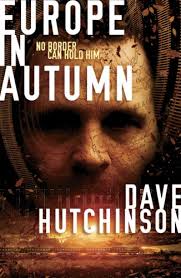 Follow that, Dave Hutchinson! Remarkably, he does. If A Man Lies Dreaming hides its artifice behind the facade of our recent past, Europe in Autumn revolves around the lodestone of our possible future. If Tidhar knows his stuff, then so does Hutchinson. I have rarely seen the ambience of middle and Eastern Europe more succinctly and accurately captured by a British writer. This isn’t your usual kind of mitteleuropaeische Wehmut, though, this is a post-Soviet Europe, ravaged by stag weekends and fin-de-siecle exhaustion. It’s superbly realised, with almost Scandinavian levels of deep irony and an economy of style that I (as a writer who tends to obsess over minutiae) found laudable and convincing. No fuss, no fannying about, just seriously good writing.
Follow that, Dave Hutchinson! Remarkably, he does. If A Man Lies Dreaming hides its artifice behind the facade of our recent past, Europe in Autumn revolves around the lodestone of our possible future. If Tidhar knows his stuff, then so does Hutchinson. I have rarely seen the ambience of middle and Eastern Europe more succinctly and accurately captured by a British writer. This isn’t your usual kind of mitteleuropaeische Wehmut, though, this is a post-Soviet Europe, ravaged by stag weekends and fin-de-siecle exhaustion. It’s superbly realised, with almost Scandinavian levels of deep irony and an economy of style that I (as a writer who tends to obsess over minutiae) found laudable and convincing. No fuss, no fannying about, just seriously good writing.
In a near-future Europe disenchanted with Schengen and fractured into a profusion of micro-states (each with its own hyper-evolved bureaucracy), Rudi is a chef minding his own business. How he manages to get co-opted into a secret pan-European organisation of spies and information traffickers is a mystery even to him. But there are bigger mysteries in store, and Rudi’s life will soon be in danger – as will the life of anyone associated with him…
To pigeon-hole this fabulous, tightly constructed, expertly wrought little masterpiece of science fiction merely as a spy caper would be to do it a serious injustice – yet the spy caper stuff is great, too. Funnier than James Bond, written with a level of literary understanding and invention that far surpasses anything muddled together by John Le Carre, Europe in Autumn is massively entertaining. It’s also the kind of SF one longs to see more of, the speculative materials used not merely as ornament but as backbone, handled with the lightness of touch that signals a continuing serious engagement and long, fond familiarity. I adored the reveal, the core concept. I’m not normally one for sequels, but I can understand how Europe in Autumn almost demands one.
Both these books are a joy to read, the kind that serve as markers along the road of SF’s great journey. Recommended.
